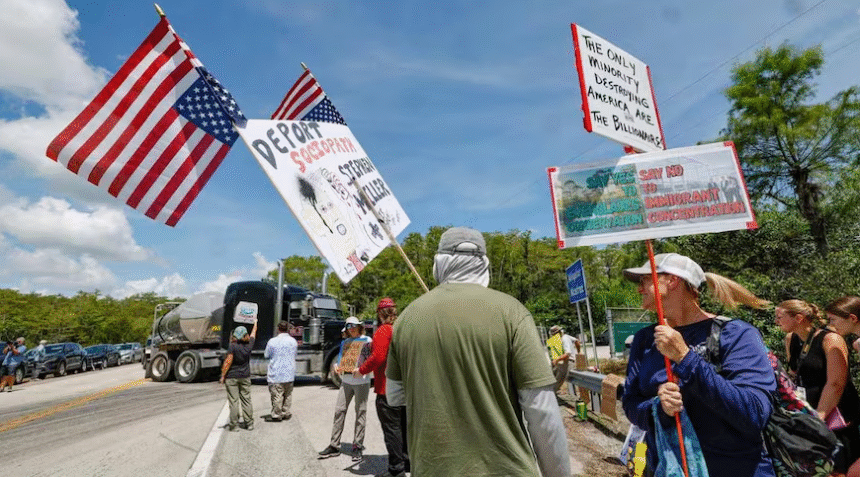A troubling revelation has emerged from Florida’s controversial detention facility known as Alligator Alcatraz: hundreds of immigrants with no criminal charges in the U.S. are being held alongside convicted criminals, according to documents obtained by the Times/Herald.
Located deep in the Everglades, this makeshift facility—described by officials as a holding site for the “vicious” and “deranged”—has become home to over 250 detainees who have no criminal history whatsoever. Their only offense? Immigration violations.
A Facility Under Scrutiny
“Alligator Alcatraz” was set up as a high-security, pop-up detention center. Images and reports show detainees living in tents and chain-link enclosures, raising concerns among human rights organizations and immigration advocates. While the facility was originally promoted as a place to hold high-risk individuals prior to deportation, the newly revealed data tells a different story.
The list, which includes more than 700 names, shows that many of the individuals held there have not been accused or convicted of any crimes, and their only contact with law enforcement stems from being undocumented or overstaying visas.
Human Rights and Legal Concerns
Advocates warn that detaining people with no criminal record in such harsh conditions blurs the line between criminal justice and immigration enforcement. Critics argue that this practice may violate both constitutional protections and international human rights standards.
“People fleeing violence or seeking a better life should not be treated like dangerous criminals,” said one immigration attorney familiar with several of the cases. “Detaining someone in a tent in the Everglades without charges sets a dangerous precedent.”
A Broader Immigration Issue
The revelations at Alligator Alcatraz reflect a broader trend in U.S. immigration enforcement, where civil immigration violations are increasingly treated as criminal acts, despite being fundamentally different in nature.
As the debate over border security, asylum, and detention policy intensifies ahead of the next election cycle, stories like this highlight the urgent need for transparency, accountability, and humane treatment in the immigration system.
Conclusion
The situation at Alligator Alcatraz raises serious questions about due process and the appropriate use of detention. Holding individuals with no criminal background in such extreme conditions may not only be unjust—it may also erode the public’s trust in the fairness of our immigration system.


Leave a Reply